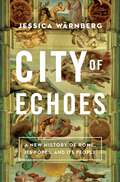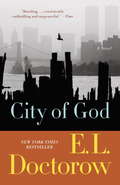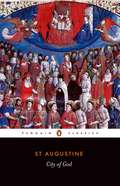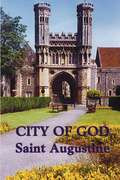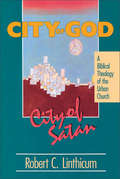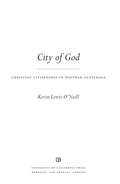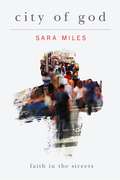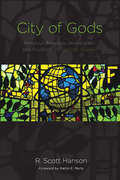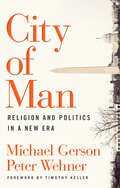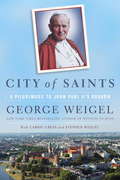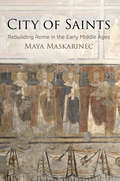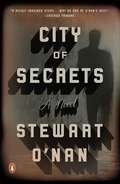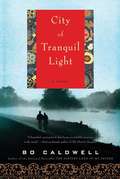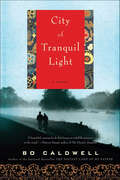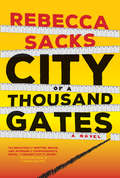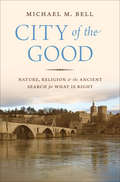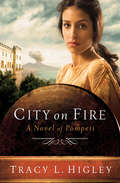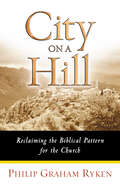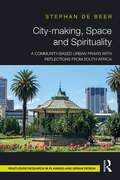- Table View
- List View
City of Dreams (Hero Book #1)
by Stephen R. Lawhead Ross A. LawheadFrom the Book Jacket: History revolves around the life of a peasant born in the Middle East more than 2000 years ago. But what if that never happened.. .until now? Imagine a world... ...still waiting for a saver... In City of Dreams, Special Agent Alex Hunter is assigned to infiltrate a radical terrorist organization. Instantly, Hunter is thrust into a treacherous web of power-crazed politicians, rabid religious fanatics, murderous street gangs, and a secret plot to overthrow ICON-the iron-fisted world government. At the center of the conspiracy lies a dark riddle: the horrific murder of a vagabond prophet called Washer John. Hunter's only clue lies in the true identity of a wandering miracle-worker from Bethlehem, Pennsylvania. When he gets too close to the truth, Hunter finds himself the prime target of an assassin's bullet.. .and the nightmare begins. Cunning and resourceful, Hunter's efforts to save himself bring him to the brink of the most important discovery of his life. Danger, suspense, intrigue, and betrayal come to a breathtaking climax in this action-packed first book of the 1HERO novel trilogy. stephen R. lawhead is a best-selling author of mythic history and imaginative fiction, having sold over five million books worldwide. His works include Byzantium, the five-part pendragon cycle, and the award-winning song of albion series. Stephen makes his home in Austria with his wife, Alice. His website is www.stephenlawhead.com. Ross lawhead studied screenplay writing for film and television at Bournemouth University in England. He is the cowriter and penciler of the "Hero" comic book series as well as this series.
City of Echoes: A New History of Rome, Its Popes, and Its People
by Jessica WärnbergFrom a bold new historian comes a vibrant history of Rome as seen through its most influential persona throughout the centuries: the pope.Rome is a city of echoes, where the voice of the people has chimed and clashed with the words of princes, emperors, and insurgents across the centuries. In this authoritative new history, Jessica Wärnberg tells the story of Rome&’s longest standing figurehead and interlocutor—the pope—revealing how his presence over the centuries has transformed the fate of the city of Rome. Emerging as the anonymous leader of a marginal cult in the humblest quarters of the city, the pope began as the pastor of a maligned and largely foreign flock. Less than 300 years later, he sat enthroned in a lofty, heavily gilt basilica, a religious leader endorsed (and financed) by the emperor himself. Eventually, the Roman pontiff would supplant even the emperors as de facto ruler of Rome and pre-eminent leader of the Christian world. By the nineteenth century, it would take an army to wrest the city from the pontiff&’s grip. As the first-ever account of how the popes&’ presence has shaped the history of Rome, City of Echoes not only illuminates the lives of the remarkable (and unremarkable) men who have sat on the throne of Saint Peter, but also reveals the bold and curious actions of the men, women, and children who have shaped the city with them, from antiquity to today. In doing so, the book tells the history of Rome as it has never been told before. During the course of this fascinating story, City of Echoes also answers a compelling question: how did a man—and institution—whose authority rested on the blood and bones of martyrs defeat emperors, revolutionaries, and fascists to give Rome its most enduring identity?
City of God
by E. L. DoctorowIn his workbook, a New York City novelist records the contents of his teeming brain--sketches for stories, accounts of his love affairs, riffs on the meanings of popular songs, ideas for movies, obsessions with cosmic processes. He is a virtual repository of the predominant ideas and historical disasters of the age. But now he has found a story he thinks may be-come his next novel: The large brass cross that hung behind the altar of St. Timothy's, a run-down Episcopal church in lower Manhattan, has disappeared...and even more mysteriously reappeared on the roof of the Synagogue for Evolutionary Judaism, on the Upper West Side. The church's maverick rector and the young woman rabbi who leads the synagogue are trying to learn who committed this strange double act of desecration and why. Befriending them, the novelist finds that their struggles with their respective traditions are relevant to the case. Into his workbook go his taped interviews, insights, preliminary drafts...and as he joins the clerics in pursuit of the mystery, it broadens to implicate a large cast of vividly drawn characters--including scientists, war veterans, prelates, Holocaust survivors, cabinet members, theologians, New York Times reporters, filmmakers, and crooners--in what proves to be a quest for an authentic spirituality at the end of this tortured century.Daringly poised at the junction of the sacred and the profane, and filled with the sights and sounds of New York, this dazzlingly inventive masterwork emerges as the American novel readers have been thirsting for: a defining document of our times, a narrative of the twentieth century written for the twenty-first.
City of God
by Saint Augustine Henry BettensonAugustine discusses different religions of Rome, Greece and of the Bible.
City of God
by Saint AugustineCity of God is an enduringly significant work in the history of Christian thought, by one of its central figuresWritten as an eloquent defence of the faith at a time when the Roman Empire was on the brink of collapse, this great theological and philosophical work by St Augustine, bishop of Hippo, examines the ancient pagan religions of Rome, the arguments of the Greek philosophers and the revelations of the Bible. Pointing the way forward to a citizenship that transcends worldly politics and will last for eternity, City of God is one of the most influential documents in the development of Christianity.Translated with Notes by Henry Bettenson with an Introduction by G. R. Evans
City of God
by St AugustineSaint Augustine of Hippo is one of the central figures in the history of Christianity, and this book is one of his greatest theological works. Written as an eloquent defense of the faith at a time when the Roman Empire was on the brink of collapse, it examines the ancient pagan religions of Rome, the arguments of the Greek philosophers, and the revelations of the Bible. Pointing the way forward to a citizenship that transcends worldly politics and will last for eternity, this book is one of the most influential documents in the development of Christianity. One of the great cornerstones in the history of Christian thought, The City of God is vital to an understanding of modern Western society and how it came into being. Begun in A.D. 413, the book's initial purpose was to refute the charge that Christianity was to blame for the fall of Rome (which had occurred just three years earlier). Indeed, Augustine produced a wealth of evidence to prove that paganism bore within itself the seeds of its own destruction. However, over the next thirteen years that it took to complete the work, the brilliant ecclesiastic proceeded to his larger theme: a cosmic interpretation of history in terms of the struggle between good and evil. By means of his contrast of the earthly and heavenly cities-- the one pagan, self-centered, and contemptuous of God and the other devout, God-centered, and in search of grace-- Augustine explored and interpreted human history in relation to eternity.
City of God, City of Satan: A Biblical Theology of the Urban City
by Robert C. LinthicumWhy is the city a battleground of hostile principalities and powers? What is the mission of the church in the city? How can the church be supported in accomplishing that mission? These are the questions that Robert Linthicum treats in his comprehensive and probing biblical theology of the city. In the Bible the city is depicted both as a dwelling place of God and his people and as a center of power for Satan and his minions. The city is one primary stage on which the drama of salvation is played out. And that is no less the case at the end of this pivotal century as megacities become the focal point of most human activity and aspirations around the world. This is a timely theology of the city that weaves the theological images of the Bible and the social realities of the contemporary world into a revealing tapestry of truths about the urban experience. Its purpose is to define clearly the mission of the church in the midst of the urban realities and to support well the work of the church in the urban world.
City of God: Christian Citizenship in Postwar Guatemala
by Kevin Lewis O’neillIn Guatemala City today, Christianity isn't just a belief system--it is a counterinsurgency. Amidst postwar efforts at democratization, multinational mega-churches have conquered street corners and kitchen tables, guiding the faithful to build a sanctified city brick by brick. Drawing on rich interviews and extensive fieldwork, Kevin Lewis O'Neill tracks the culture and politics of one such church, looking at how neo-Pentecostal Christian practices have become acts of citizenship in a new, politically relevant era for Protestantism. Focusing on everyday practices--praying for Guatemala, speaking in tongues for the soul of the nation, organizing prayer campaigns to combat unprecedented levels of crime--O'Neill finds that Christian citizenship has re-politicized the faithful as they struggle to understand what it means to be a believer in a desperately violent Central American city. Innovative, imaginative, conceptually rich, City of God reaches across disciplinary borders as it illuminates the highly charged, evolving relationship between religion, democracy, and the state in Latin America.
City of God: Faith in the Streets
by Sara MilesParadise is a garden...but heaven is a city. From the acclaimed author of Take This Bread and Jesus Freak comes a powerful new account of venturing beyond the borders of religion into the unpredictable territory of faith. On Ash Wednesday, 2012, Sara Miles and her friends left their church buildings and carried ashes to the buzzing city streets: the crowded dollar stores, beauty shops, hospital waiting rooms, street corners and fast-food joints of her neighborhood. They marked the foreheads of neighbors and strangers, sharing blessings with waitresses and drunks, believers and doubters alike. CITY OF GOD narrates the events of the day in vivid detail, exploring the profound implications of touching strangers with a reminder of common mortality. As the story unfolds, Sara Miles also reflects on life in her city over the last two decades, where the people of God suffer and rejoice, building community amid the grit and beauty of this urban landscape. CITY OF GOD is a beautifully written personal narrative, rich in complex, real-life characters, and full of the "wild, funny, joyful, raucous, reverent" moments of struggle and faith that have made Miles one of the most enthralling Christian writers of our time.
City of Gods: Religious Freedom, Immigration, and Pluralism in Flushing, Queens
by R. Scott HansonReligious Freedon, Immigration, and Pluralism in Flushing, Queens
City of Man: Religion and Politics in a New Era
by Peter Wehner Michael GersonAn era has ended. The political expression that most galvanized evangelicals during the past quarter-century, the Religious Right, is fading. What's ahead is unclear. Millions of faith-based voters still exist, and they continue to care deeply about hot-button issues like abortion and gay marriage, but the shape of their future political engagement remains to be formed.Into this uncertainty, former White House insiders Michael Gerson and Peter Wehner seek to call evangelicals toward a new kind of political engagement -- a kind that is better both for the church and the country, a kind that cannot be co-opted by either political party, a kind that avoids the historic mistakes of both the Religious Left and the Religious Right.Incisive, bold, and marked equally by pragmatism and idealism, Gerson and Wehner's new book has the potential to chart a new political future not just for values voters, but for the nation as a whole.
City of Man: Religion and Politics in a New Era
by Peter Wehner Michael GersonAn era has ended. The political expression that most galvanized evangelicals during the past quarter-century, the Religious Right, is fading. What's ahead is unclear. Millions of faith-based voters still exist, and they continue to care deeply about hot-button issues like abortion and gay marriage, but the shape of their future political engagement remains to be formed.Into this uncertainty, former White House insiders Michael Gerson and Peter Wehner seek to call evangelicals toward a new kind of political engagement -- a kind that is better both for the church and the country, a kind that cannot be co-opted by either political party, a kind that avoids the historic mistakes of both the Religious Left and the Religious Right.Incisive, bold, and marked equally by pragmatism and idealism, Gerson and Wehner's new book has the potential to chart a new political future not just for values voters, but for the nation as a whole.
City of Saints
by George Weigel Stephen Weigel Carrie Gress"Karol Wojtyła, Pope John Paul II, was a man whose life was the expression of a richly textured and multidimensional soul. The many layers of that soul took on their first, mature form in Kraków." - George Weigel In this beautifully illustrated spiritual travelogue, New York Times bestselling author George Weigel leads readers through the historic streets of Kraków, Poland, introducing one of the world's great cities through the life of one of the most influential Catholic leaders of all time. "To follow Karol Wojtyła through Kraków is to follow an itinerary of sanctity while learning the story of a city." Weigel writes. "Thus, in what follows, the story of Karol Wojtyła, St. John Paul II, and the story of Kraków are interwoven in a chronological pilgrimage through the life of a saint that reveals, at the same time, the dramatic history and majestic culture of a city where a boy grew into a man, priest, a bishop--and an apostle to the world." With stunning photographs by Stephen Weigel and notes on the city's remarkable fabric by Carrie Gress, City of Saints offers an in-depth look at a man and a city that made an indelible impression on the life and thought of the Catholic Church and the 21st century world.From the Trade Paperback edition.
City of Saints: Rebuilding Rome in the Early Middle Ages (The Middle Ages Series)
by Maya MaskarinecIt was far from inevitable that Rome would emerge as the spiritual center of Western Christianity in the early Middle Ages. After the move of the Empire's capital to Constantinople in the fourth century and the Gothic Wars in the sixth century, Rome was gradually depleted physically, economically, and politically. How then, asks Maya Maskarinec, did this exhausted city, with limited Christian presence, transform over the course of the sixth through ninth centuries into a seemingly inexhaustible reservoir of sanctity?Conventional narratives explain the rise of Christian Rome as resulting from an increasingly powerful papacy. In City of Saints, Maskarinec looks outward, to examine how Rome interacted with the wider Mediterranean world in the Byzantine period. During the early Middle Ages, the city imported dozens of saints and their legends, naturalized them, and physically layered their cults onto the city's imperial and sacred topography. Maskarinec documents Rome's spectacular physical transformation, drawing on church architecture, frescoes, mosaics, inscriptions, Greek and Latin hagiographical texts, and less-studied documents that attest to the commemoration of these foreign saints. These sources reveal a vibrant plurality of voices—Byzantine administrators, refugees, aristocrats, monks, pilgrims, and others—who shaped a distinctly Roman version of Christianity. City of Saints extends its analysis to the end of the ninth century, when the city's ties to the Byzantine world weakened. Rome's political and economic orbits moved toward the Carolingian world, where the saints' cults circulated, valorizing Rome's burgeoning claims as a microcosm of the "universal" Christian church.
City of Secrets: A Novel
by Stewart O'Nan"Stewart O'Nan's City of Secrets will keep you up all night reading - what a beautifully crafted novel." - Alan Furst, New York Times bestselling author of Mission to ParisFrom master storyteller Stewart O'Nan, a timely moral thriller of the Jewish underground resistance in Jerusalem after the Second World WarIn 1945, with no homes to return to, Jewish refugees by the tens of thousands set out for Palestine. Those who made it were hunted as illegals by the British mandatory authorities there and relied on the underground to shelter them; taking fake names, they blended with the population, joining the wildly different factions fighting for the independence of Israel. City of Secrets follows one survivor, Brand, as he tries to regain himself after losing everyone he's ever loved. Now driving a taxi provided--like his new identity--by the underground, he navigates the twisting streets of Jerusalem as well as the overlapping, sometimes deadly loyalties of the resistance. Alone, haunted by memories, he tries to become again the man he was before the war--honest, strong, capable of moral choice. He falls in love with Eva, a fellow survivor and member of his cell, reclaims his faith, and commits himself to the revolution, accepting secret missions that grow more and more dangerous even as he begins to suspect he's being used by their cell's dashing leader, Asher. By the time Brand understands the truth, it's too late, and the tragedy that ensues changes history. A noirish, deeply felt novel of intrigue and identity written in O'Nan's trademark lucent style, City of Secrets asks how both despair and faith can lead us astray, and what happens when, with the noblest intentions, we join movements beyond our control.From the Hardcover edition.
City of Tranquil Light: A Novel
by Bo Caldwell“A beautifully written, often riveting, heartbreaking, heart-healing, wise, and sweet-tempered novel.” A tender and elegiac portrait of a young marriage set against the backdrop of the shifting face of a beautiful but torn nation. Will Kiehn is seemingly destined for life as a humble farmer in the Midwest when, having felt a call from God, he travels to the vast North China Plain in the early twentieth century. There he is surprised by love and weds a strong and determined fellow missionary, Katherine. They soon find themselves witnesses to the crumbling of a more than two-thousand-year-old dynasty that plunges the country into decades of civil war. As the couple works to improve the lives of the people of Kuang P’ing Ch’eng—City of Tranquil Light, a place they come to love—and face incredible hardship, will their faith and relationship be enough to sustain them?
City of Tranquil Light: A Novel
by Bo Caldwell“What ardent, dazzling souls emerge from these American missionaries in China . . . A beautiful, searing book that leaves an indelible presence in the mind.” —Patricia Hampl, author of The Art of the Wasted DayWill Kiehn is seemingly destined for life as a humble farmer in the Midwest when, having felt a call from God, he travels to the vast North China Plain in the early twentieth-century. There he is surprised by love and weds a strong and determined fellow missionary, Katherine. They soon find themselves witnesses to the crumbling of a more than two-thousand-year-old dynasty that plunges the country into decades of civil war. As the couple works to improve the lives of the people of Kuang P’ing Ch’eng—City of Tranquil Light, a place they come to love—and face incredible hardship, will their faith and relationship be enough to sustain them?Told through Will and Katherine’s alternating viewpoints—and inspired by the lives of the author’s maternal grandparents—City of Tranquil Light is a tender and elegiac portrait of a young marriage set against the backdrop of the shifting face of a beautiful but torn nation. A deeply spiritual book, it shows how those who work to teach others often have the most to learn, and is further evidence that Bo Caldwell writes “vividly and with great historical perspective” (San Jose Mercury News).“City of Tranquil Light is just my kind of book. It is full of light, even at its darkest moments. I relished the hours spent with this dedicated and intrepid couple and will not soon forget them. Bo Caldwell has honored her missionary grandparents with her storytelling skills.” —Gail Godwin, New York Times–bestselling author
City of a Thousand Gates: A Novel
by Rebecca SacksA novel of great humanity, compassion and astonishing immediacy, this unique debut portrays the emotional reality of contemporary life in the West Bank and the irreconcilable Israeli-Palestinian conflict. A collage of narrative voices and different points of view are woven around the murder of two young people, one Israeli and one Palestinian.Brave and bold, this gorgeously written work of fiction introduces a large cast of characters in a setting where violence is routine, even normal, and where survival is defined by boundaries, walls and checkpoints that force people to live and love within and across them.Hamid has come into Israeli territory illegally to work. He runs into Vera, a German journalist on her way to Jerusalem to cover the story of Salem, a Palestinian boy who is in a coma after being beaten by Israeli teenagers. On her way to the hospital, Vera runs in front of a car driven by Ido, a new father, who is distracted by thoughts of a young Jewish girl murdered by a terrorist. Ori, an eighteen-year-old soldier from a nearby settlement, is guarding the checkpoint through which Hamid’s professor, Samar, must pass. This powerful novel delivers an eminently human, complex and compassionate view of an irreconcilable conflict. Sacks writes unflinchingly about the hate and violence that continues to fuel tensions in the West Bank. It’s an extraordinary debut work of fiction that mines the range of shared human emotions with riveting engagement and understanding.
City of the Good: Nature, Religion, and the Ancient Search for What Is Right
by Michael Mayerfield BellHow we came to seek absolute good in religion and nature—and why that quest often leads us astrayPeople have long looked to nature and the divine as paths to the good. In this panoramic meditation on the harmonious life, Michael Mayerfeld Bell traces how these two paths came to be seen as separate from human ways, and how many of today’s conflicts can be traced back thousands of years to this ancient divide.Taking readers on a spellbinding journey through history and across the globe, Bell begins with the pagan view, which sees nature and the divine as entangled with the human—and not necessarily good. But the emergence of urban societies gave rise to new moral concerns about the political character of human life. Wealth and inequality grew, and urban people sought to justify their passions. In the face of such concerns, nature and the divine came to be partitioned from the human, and therefore seen to be good—but they also became absolute and divisive.Bell charts the unfolding of this new moral imagination in the rise of Buddhism, Christianity, Daoism, Hinduism, Jainism, and many other traditions that emerged with bourgeois life. He follows developments in moral thought, from the religions of the ancient Sumerians, Greeks, and Hebrews to the science and environmentalism of today, along the way visiting with contemporary indigenous people in South Africa, Costa Rica, and the United States. City of the Good urges us to embrace the plurality of our traditions—from the pagan to the bourgeois—and to guard against absolutism and remain open to difference and its endless creativity.
City on Fire
by Tracy L. HigleyPreviously released as Pompeii.As Vesuvius churns, a slave girl-turned-gladiator joins forces with an unlikely source to seek justice.In the coastal town of Pompeii, a new gladiator prepares to fight. But this gladiator hides a deadly secret: she's a runaway Jewish slave girl named Ariella, disguised as a young boy. A savvy fighter, Ariella determines to triumph in the arena, knowing her life will be forfeit should anyone uncover the truth.Cato, a wealthy politician, moved to Pompeii after tiring of the corruption in Rome. But he soon learns that Pompeii is just as corrupt, and if he doesn't play the game, his family could pay the price. Determined to bring about justice for the citizens of Pompeii, Cato searches for allies. But what he discovers instead is a confounding group of Christians . . . and a young female gladiator whose fame is growing daily.Political unrest reaches a boiling point as Christians are jailed and executed, and the mountain in the distance threatens to destroy the city with its river of fire. Cato and Ariella must act quickly and courageously to save their loved ones before all is lost.
City on a Hill: Reclaiming the Biblical Pattern for the Church
by Philip Graham RykenWe are now living in post-Christian times, when Christianity no longer is the prevailing influence on the mind and heart of our culture. But we cannot compromise. More than ever before, it is imperative that Christians understand and embrace the biblical pattern for the church. Philip Graham Ryken knows that the changing face of America makes the need for the church to remain steadfast even more important. City on a Hill will provide readers with a deeper understanding of how to live for Christ in the twenty-first century: go back to the model set out in the first century. Sure to be an encouragement and challenge to anyone concerned about the effectiveness of the church today.
City on a Hill: Reclaiming the Biblical Pattern for the Church
by Philip Graham RykenWe are now living in post-Christian times, when Christianity no longer is the prevailing influence on the mind and heart of our culture. But we cannot compromise. More than ever before, it is imperative that Christians understand and embrace the biblical pattern for the church. Philip Graham Ryken knows that the changing face of America makes the need for the church to remain steadfast even more important. City on a Hill will provide readers with a deeper understanding of how to live for Christ in the twenty-first century: go back to the model set out in the first century. Sure to be an encouragement and challenge to anyone concerned about the effectiveness of the church today.
City on a Hilltop: American Jews and the Israeli Settler Movement
by Sara Yael HirschhornSince Israel’s 1967 war, more than 60,000 Jewish-Americans have settled in the occupied territories, transforming politics and sometimes committing shocking acts of terrorism. Yet little is known about why they chose to live at the center of the Israeli-Palestinian conflict. Sara Yael Hirschhorn unsettles stereotypes about these liberal idealists.
City-making, Space and Spirituality: A Community-Based Urban Praxis with Reflections from South Africa
by Stéphan de BeerThis book is about the soul of the city, embodied in its spaces and people. It traces dynamics in inner city neighbourhoods of South Africa’s post-apartheid capital, Pretoria. Viewing the city through its most vulnerable people and places, it recognizes that urban space is never neutral and shaped by competing value frameworks. The first part of the book invites planners, city-makers, and ordinary urban citizens, to consider a new self-understanding, reclaiming their agency in the city-making process. Through the metaphor of "becoming like children", planning practice is deconstructed and re-imagined. A praxis-based methodology is presented, cultivating four distinct moments of entering, reading, imagining and co-constructing the city. After deconstructing urban spaces and discourses, the second part of the book explores a concrete spirituality and ethic of urban space. It argues for a shift from planning as technocracy, to planning as immersed, participatory artistry: opening up to the "genius" of space, responsive to urban cries, and joining to construct new, soul-full spaces. Local communities and interconnected movements become embodiments of urban alternatives – through resistance and reconstruction; building on local assets; animating local reclamations; and weaving nets of hope that will span the entire city. Providing a concrete methodology for city-making that is rooted in a community-based urban praxis, this book will be of interest to urban planning researchers, professional planners and designers and also grass-root community developers or activists.
Civic Ceremony and Religion in Medieval Bruges C. 1300-1520
by Andrew Brown"Public religious practice lay at the heart of civic society in late medieval Europe. In this illuminating study, Andrew Brown draws on the rich and previously little-researched archives of Bruges, one of medieval Europe's wealthiest and most important towns, to explore the role of religion and ceremony in urban society. The author situates the religious practices of citizens - their investment in the liturgy, commemorative services, guilds and charity - within the contexts of Bruges' highly diversified society and of the changes and crises the town experienced. Focusing on the religious processions and festivities sponsored by the municipal government, the author challenges much current thinking on, for example, the nature of 'civic religion'. Re-evaluating the ceremonial links between Bruges and its rulers, he questions whether rulers could dominate the urban landscape by religious or ceremonial means, and offers new insight into the interplay between ritual and power of relevance throughout medieval Europe"--

